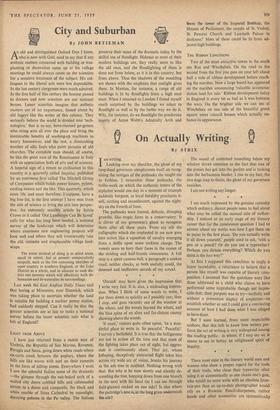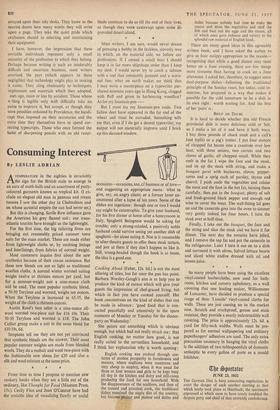Q On Actually Writing
By .STRIX
T AM writing. I Looking over my shoulder, the ghost of my long-dead governess compliments itself on recog- nising the vestiges of the pothooks she taught me to fashion. I remember those pothooks, the trellis-work on which the authentic letters of the alphabet would one day in a moment of triumph suddenly burgeon, as loyal heraldry proclaims it- self, sizzling and incandescent, against the night- sky on the Fourth of June.
The pothooks were formal, delicate, drooping growths, like tropic ferns in a conservatory: It is clever of my governess's ghost to recognise them after all these years. From my nib the calligraphy which she implanted in me now goes into action like a squadron of cavalry emerging from a defile upon some reckless charge. The vowels seem to bury their faces in the manes of the striding and half-frantic consonants. A full stop is a spent cannon-ball, a paragraph a sunken road; neither checks, as both usefully could, the doomed and ineffective onrush of my scrawl.
'Onrush' may have given the impression that I write very fast. It is, alas, a misleading impres- sion. When I think of some words to write, put them down as quickly as I possibly can; then I stop, and gaze vacantly out of the window at the wheat, and the woods beyond the wheat, and the blue spine of an alien and far-distant county showing above the woods.
`It must,' visitors quite often opine, 'be a won- derful place to write in. So peaceful.' Peaceful! I survey a battlefield. It is true that the belligerents are not in action all the time and that most of the lighting takes place out of sight; but aggres- sion is continuously afoot. That jay, whose lolloping, deceptively abstracted flight takes him across my wide arc of vision, breaks his journey at the ash tree in midfield. Nothing wrong with that. But why is he now slowly and silently de- scending the tree, hopping down from one branch to the next with hi's head (as I can see through field-glasses) cocked on one side? Is that where the partridge's nest is, in the long grass underneath the ash? The sound of contented munching below my window draws attention to the fact that one of the ponies has got into the garden and is tucking into the herbaceous border. I rise to my feet, the two dogs leap to theirs, the ghost of my governess vanishes.
I am not writing any longer.
I am much impressed by the genuine curiosity which ordinary, decent people seem to feel about what may be called the manual side of author- ship. I noticed at an early stage of my literary career that far the commonest question I had to answer about my works was how I got them on to paper in the first place. 'Do you actually write it all down yourself,' people used to ask, 'with a pen or a pencil? Or do you use a typewriter? Perhaps you dictate everything? Which do you think is the best way?'
At first I supposed this catechism to imply a latent incredulity, a reluctance to believe that a person like myself was capable of literary com- position. I assumed that the questions were like those addressed to a child who claims to have performed some improbable though not impos- sible feat; their purpose was to try—tactfully and without a premature display of scepticism—to establish whether or not I could give a convincing account of ho W I had done what I was alleged to have done.
But I soon learned, from more respectable authors, that this itch to know how writers per- form the act of writing is very widespread among the reading public : in whom, if I may say so, it seems. to me to betray an enlightened spirit of inquiry.
There must exist in the literary world men and women who show a proper regard for the tools of their trade, who clean their typewriter after using it as automatically as one cleans one's gun, who would no more write with an obsolete foun- tain-pen than an up-to-date photographer would rely on a Brownie. Pencil-sharpeners, rubber bands and other accessories are symmetrically arrayed upon their tidy desks. They know to the nearest dozen how many words they will write upon a page. They take the quiet pride which craftsmen should in selecting and maintaining their equipment.
I have, however, the impression that these enviable individuals represent only a small minority of the profession to which they belong. Perhaps because writing is such an intolerably difficult and uncertain -business, , most writers overlook the part (which appears to them negligible) that technology might play in making it easier. They cling obstinately to techniques, implements and materials which they adopted, ears ago, more or less by accident. Those whose w -iting is legible only with difficulty take no pains to improve it, but accept, as though they were penalties ordained by Providence, the handi- caps thus imposed on their secretaries and the extra time they themselves have to spend cor- recting typescripts. Those who once formed the habit of sharpening pencils with an old razor- blade continue to do so till the end of their lives, as though they were castaways upon some ill- provided desert island.
Most writers, I am sure, would never dream of pursuing a hobby in the feckless, slovenly way in which, on the material side, we follow our professions. If I owned a small boat I should keep it in far more shipshape order than I keep my desk. I would never try to patch a salmon with a reel that constantly jammed and a worn- out line; what on earth makes me think that I may write a masterpiece on a typewriter pur- chased nineteen years ago in Hong Kong, clogged with fluff and given to harbouring woodlice? As for my fountain-pen- But I must lay my fountain-pen aside. Two fallow deer have appeared in the far end of the wheat and must be extruded. Something tells me that, even if I do get a decent typewriter, my output will not materially improve until I brick up this damned window.



































 Previous page
Previous page